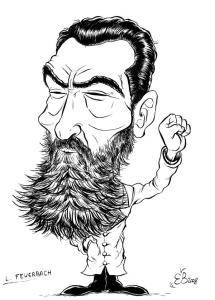Ludwig Feuerbach, a German philosopher (if his name didn’t give it away), offered a critique of religion, particularly the Christian religion, that ought to have weight as we self-criticize our own understanding of God. Karl Barth took Feuerbach’s critique to heart as he saw in it a critique of natural theology. Here is a key passage from Feuerbach that  synopsizes his critique:
synopsizes his critique:
Religion, at least the Christian, is the relation of man to himself, or more correctly to his own nature (i.e., his subjective nature); but a relation of it, viewed as a nature apart from his own. The divine being is nothing else than the human being, or, rather, the human nature purified, freed from the limits of the individual man, made objective—i.e., contemplated and revered as another, a distinct being. All the attributes of the divine nature are, therefore, attributes of the human nature.[1]
For Feuerbach God is simply a self-projection of the inner-man. Ironically, what people like Feuerbach et al. are doing is simply living out the metanarrative of Genesis 3, and the original serpentine lie. That we can be like, or construct God or gods.
But here’s where this becomes relevant, particularly for Christians in the main. Insofar that Christians attempt to imbibe the culture, even if in the name of Jesus, they end up, like the culture at large, under the influence of someone like Feuerbach; self-projecting a notion of God who confirms them in their inner-desires. In other words, they are living the life of an idolater, even in the name of Jesus Christ (which is the actual way the LORD’s name is taken in vain). Further, when people abandon the Christian faith it is because they recognize or ‘feel’ (subconsciously) that the God they have been worshipping is no longer needed, since He already affirms all of their wants or desires anyway; or, because the God they are presented with comes from the self-projections of the philosophers, and thus cannot actually live up to what the Gospel claims to be as the power of God.
Barth was right to appropriate Feuerbach, since all Feuerbach was doing, from his materialistic vantage point, was confronting the idolatry of the human heart. If God can speak through Balaam’s ass, He can speak through Ludwig Feuerbach.
[1] Ludwig Feuerbach, The Essence of Christianity, trans. George Eliot (New York: Harper and Row, 1957), 14.
